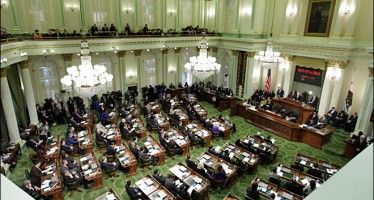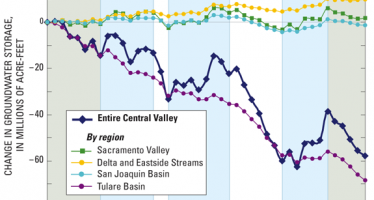Assembly Takes on Free Speech in Charters
AUG. 3, 2010
By KATY GRIMES
After passing several innocuous-sounding resolutions, Assembly members were back at work in the legislature yesterday after summer recess, but quickly found themselves voting on a surprisingly partisan charter school bill.
The first resolution to pass was Assembly Concurrent Resolution 162, authored by Jim Beall, D-San Jose, which names one week each October as Disability History week. The bill passed unanimously.
ACR 173, authored by Noreen Evans, D-Santa Rosa, proclaims the third week of April as California Native Plant Week. Assembly Speaker Pro Tem Fiona Ma asked for a voice vote. She was clearly anticipating unanimous support but Assemblyman Chris Norby, R-Fullerton, loudly proclaimed the only “no” vote.
Senate Joint Resolution 23, originally introduced by Sen. Abel Maldonado and now authored by Joe Simitian, D-San Jose, urges the president and U.S. Congress to support research for mitochondrial disease. Again, Norby provided the lone “no” vote.
Most actual bills passed unanimously and did not appear to have much financial impact on the state. But SB 438, authored by Leland Yee, D-San Francisco, offered more controversy among Assembly members.
Originally a bill to implement accelerated enrollment of pregnant women and children women in Medi-Cal, this bill, renamed “Charter schools: freedom of speech and of the press,” would require charter schools to adhere to state law protecting free speech rights of students. According to the author’s office, “Senate Bill 438 simply clarifies that charter schools must adhere to existing laws that protect student expression on campus, and protects both students and teachers for exercising their rights.”
The Senate analysis states, “More specifically, this bill adds ‘charter schools’ to the Education Code relating to student freedom of the press, without censorship.”
According to Adam Keigwin, Yee’s Chief of Staff, Yee authored AB 2581 in 2006, which bans administrators form censoring student journalists by administrators and protects students from being disciplined for any speech or press activities. “After being elected to the Senate, in 2008, he followed up with SB 438 to protect high school and college teachers as well as other school employees from retaliation by administrators as a result of student speech,” Keigwin said.
But Assemblywoman Diane Harkey, R-Dana Point, who provided one of the 19 opposing votes to Yee’s bill, called the bill “an unnecessary attack” on Charter schools. “We all are entitled to freedom of speech but students should have some guidance in their expression while under adult supervision or per classroom instruction,” she added.
Keigwin said the recent bill was pur forward merely to clear up any ambiguity to the previous law. “SB 438 explicitly states that California charter schools must adhere to the state’s student speech and employee protection laws,” he said.
According to a source familiar with the bill, the “no” votes by Assembly members came from Republicans who don’t want to see charter schools regulated. “The bill is far too vague,” th e source said.
A legislative staff member who asked not to be named because the person is not authorized to talk to the media anticipate a slew of anti-charter school bills once a new governor takes office. “Yee’s SB 438 is just the beginning,” the staffer said.
Keigwin said that Yee’s bill was triggered by an Orange County charter school which had prevented the school newspaper from publishing a story. “Instead of waiting for a lawsuit, Yee though it would be quicker and less expensive to carry legislation clarifying his original free speech law, and how it applies to charter schools as well as public and private schools in the state,” he said.
Harkey disagreed. “I, as a student, was subjected to instructor edits even in the University environment,” she said. “The instructor that inspired the legislation by apparently over-stepping her authority, according to the author, was terminated pursuant to the school’s policies. The system worked without the state’s interference.”
Related Articles
Transparency measure appears headed to November ballot
A ballot measure aimed at increasing legislative transparency crossed a vital threshold on Thursday and appears poised to be on
VIDEO: A CEO’s advice for Gov. Jerry Brown
Innovation is at the core of California’s identity. Now the Golden State needs to embrace innovation to build a better
Groundwater war breaks out
Future historians might mark July 20 as the date when a full scale war broke out over California’s groundwater.




